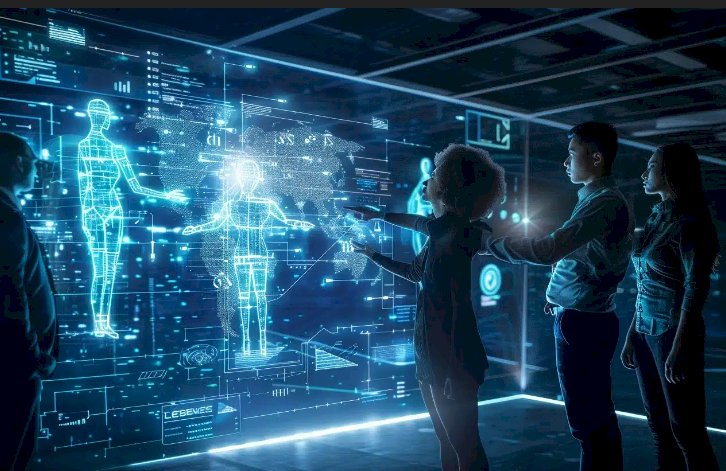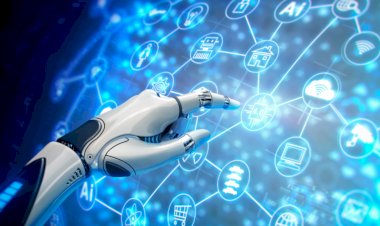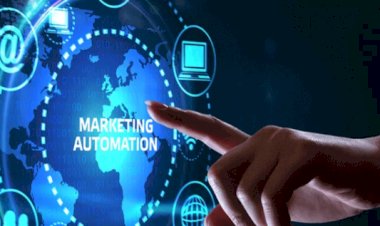Tech B2B Business Trends to Watch in 2025: Shaping the Future of Enterprises

As we approach 2025, the landscape of technology-driven B2B (business-to-business) operations is rapidly evolving. The increasing adoption of digital tools, automation, and artificial intelligence (AI) is transforming the way businesses operate and interact with each other. Companies are increasingly focusing on leveraging technology to improve efficiency, enhance customer experience, and remain competitive in an ever-changing market. In this article, we’ll explore the top tech B2B business trends that are expected to shape the future of enterprises in 2025.
1. AI-Driven Business Models
Artificial Intelligence (AI) will continue to revolutionize B2B business models by automating processes, providing predictive insights, and enhancing decision-making capabilities. In 2025, AI-driven solutions will be deeply integrated into various B2B operations, from supply chain management to customer relationship management (CRM) and marketing.
- AI-powered analytics will enable businesses to make more informed decisions by predicting market trends, optimizing pricing strategies, and identifying sales opportunities.
- Chatbots and virtual assistants will continue to enhance customer service, automating routine queries and improving response times, making B2B interactions more seamless and efficient.
- AI in supply chain management will enable real-time monitoring, predictive maintenance, and demand forecasting, reducing costs and minimizing disruptions.
2. Hyper-Personalization in B2B Marketing
In the age of data-driven decision-making, B2B businesses will increasingly rely on hyper-personalization to connect with their clients. Unlike traditional B2B marketing, where communication was often one-size-fits-all, businesses in 2025 will leverage AI, big data, and machine learning to tailor marketing campaigns to specific industries, companies, and even individual decision-makers.
- Account-Based Marketing (ABM) will continue to rise, as businesses focus on highly personalized campaigns targeting specific key accounts.
- Personalization will not only be limited to content but also to the entire buyer journey, with predictive analytics offering insights into what clients need and when they need it.
- B2B companies will rely on predictive customer profiling to offer solutions that meet specific customer pain points, leading to higher engagement and conversion rates.
3. Cloud Ecosystems and Collaborative Platforms
As businesses increasingly move toward remote and hybrid work models, cloud ecosystems will become a central component of B2B operations. By 2025, more businesses will adopt integrated cloud-based platforms that offer flexibility, scalability, and seamless collaboration across departments and teams.
- Cloud solutions will evolve to provide real-time data sharing and collaboration, enabling businesses to operate more efficiently and adapt quickly to market changes.
- The multi-cloud approach will gain traction, allowing companies to use different cloud services for different aspects of their operations, such as one cloud provider for storage and another for advanced analytics.
- Collaborative tools and platforms will streamline workflow and reduce silos within organizations, facilitating cross-functional teamwork even across geographic boundaries.
4. 5G-Enabled B2B Services
The widespread rollout of 5G networks will have a profound impact on B2B businesses in 2025. The ultra-fast speeds and low latency of 5G will unlock new opportunities in fields such as the Internet of Things (IoT), augmented reality (AR), and remote operations.
- IoT solutions will flourish, as businesses use 5G to connect devices and sensors, enabling real-time data collection and analysis across manufacturing, logistics, healthcare, and more.
- Smart factories will become more prevalent, using 5G-enabled IoT devices to monitor and optimize production processes with minimal human intervention.
- Augmented and virtual reality applications will enhance everything from remote collaboration to product demonstrations and customer interactions.
5. Automation and Robotic Process Automation (RPA)
Automation, and specifically Robotic Process Automation (RPA), will be central to B2B businesses by 2025. RPA allows businesses to automate repetitive, rules-based tasks, freeing up human resources for more complex, value-added work. In the future, RPA will go beyond basic automation, incorporating AI and machine learning to handle more sophisticated processes.
- RPA will enable businesses to automate complex workflows across finance, customer service, HR, and procurement, improving efficiency and reducing operational costs.
- Intelligent automation will allow machines to learn from past data, adapt to new situations, and make more autonomous decisions in real-time.
- Human-robot collaboration will increase, as businesses integrate RPA with AI to enhance decision-making, reduce manual errors, and improve customer satisfaction.
6. Blockchain for Enhanced Security and Transparency
Blockchain technology will become more mainstream in B2B transactions by 2025, providing enhanced security, transparency, and efficiency in areas such as supply chain management, payments, and data sharing.
- Blockchain-based supply chain solutions will offer end-to-end visibility, allowing businesses to track products, verify authenticity, and ensure compliance with regulations.
- In B2B contracts and payments, smart contracts built on blockchain will automate and secure transactions, reducing the need for intermediaries and lowering transaction costs.
- Blockchain will also improve data security, protecting businesses from cyberattacks and unauthorized access, particularly in industries handling sensitive information such as finance, healthcare, and government.
7. Sustainability as a Core Business Strategy
Sustainability will be at the forefront of B2B business strategies in 2025, driven by both regulatory pressures and consumer demand for eco-friendly practices. Businesses will increasingly integrate sustainable technologies into their operations and products, while focusing on reducing their carbon footprints.
- Green technologies such as renewable energy, carbon offset programs, and energy-efficient systems will become standard in B2B sectors such as manufacturing, logistics, and construction.
- B2B companies will adopt circular economy models, focusing on reducing waste, recycling materials, and designing products that have a minimal environmental impact.
- Transparency in sustainability efforts will be crucial, as businesses use blockchain and IoT to track and report their environmental impacts in real-time, building trust with customers and partners.
8. Cybersecurity as a Top Priority
As businesses become more digitized and interconnected, the threat of cyberattacks will continue to grow. By 2025, cybersecurity will be a top priority for B2B companies, as they seek to protect sensitive data, intellectual property, and customer information from increasingly sophisticated threats.
- Companies will adopt AI-powered cybersecurity solutions that can detect, analyze, and respond to cyber threats in real-time.
- Zero-trust architectures will become the norm, ensuring that no device, user, or system is trusted by default, even within the corporate network.
- Cybersecurity education and awareness will be critical, as human error continues to be one of the most common causes of data breaches. Businesses will invest in training employees to recognize and prevent cyber threats.
9. Subscription-Based Business Models
The subscription-based business model, already popular in the B2C space, will expand in B2B industries by 2025. Instead of one-time transactions, B2B businesses will increasingly offer products and services on a subscription basis, providing customers with ongoing value while creating predictable revenue streams.
- Software-as-a-Service (SaaS) platforms will continue to dominate, offering cloud-based solutions on a subscription basis for everything from CRM to project management.
- Businesses in industries such as manufacturing and logistics will adopt Equipment-as-a-Service (EaaS) models, where clients pay for the usage of equipment or tools rather than purchasing them outright.
- Subscription services will create stronger customer relationships, as businesses focus on delivering ongoing value, support, and updates.
10. Data-Driven Decision Making and Analytics
In 2025, B2B businesses will rely heavily on data-driven decision making to optimize operations, improve customer experiences, and enhance profitability. As more data is collected through IoT devices, customer interactions, and business processes, companies will use advanced analytics to gain actionable insights.
- Predictive analytics will help businesses forecast market trends, customer behavior, and operational challenges, allowing for more proactive decision-making.
- Data-as-a-Service (DaaS) models will enable businesses to sell or share valuable datasets with partners, helping to create data-driven ecosystems.
- Real-time analytics will allow businesses to monitor key performance indicators (KPIs) and respond to issues or opportunities as they arise.
Conclusion
As technology continues to advance, the B2B landscape in 2025 will be defined by innovation, connectivity, and data-driven strategies. Businesses that embrace these trends — from AI and automation to cybersecurity and sustainability — will be well-positioned to thrive in a rapidly changing market. To stay competitive, B2B companies must invest in cutting-edge technologies, adopt flexible business models, and prioritize customer-centric strategies that deliver long-term value.



















